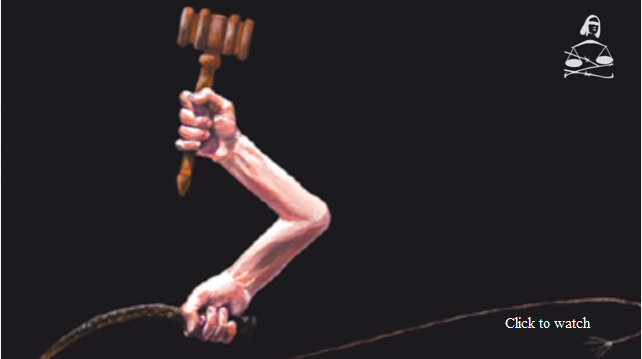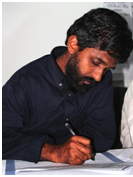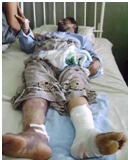See the YouTube Video relating to this article.

Journalist, Poddala Jayantha in a moving article, written in Sinhala, recalls his ordeal which took place exactly 7 years ago in the evening of June 1st that shocked the entire nation. A threat which has been made to him by the brother of the then President Mahinda Rajapaksa, Gotabhaya Rajapaksa, was to be carried out on that fateful day. He was picked up at Embuludeniya junction by a group of people who had arrived in a white van, and was severely beaten up. He recalls about being beaten about hundred times on his head, chest, lower abdomen and then being put inside the van which was in fact a mobile torture chamber.
He was blindfolded and his hands were tied behind his back, they shaved his beard and hair, and put his hair inside his mouth, they have also severely beaten him up, broken the fingers of both his hands and then tried to break both his legs. They had inserted a wooden pole beneath his legs on which they broke his left leg and also caused severe injuries to the other leg. Then with the hair still inside his mouth they had tied his mouth with his hair inside and then threw him out of the moving van into a ditch and left him near the Angoda hospital road near a shrub jungle. It was a driver of a passing by three wheeler, who saw his body and then brought several other three wheeler drivers who have been kind enough to take him to a hospital. He recalls with gratitude those brave people who despite of the terror ridden times came to save his life.
also severely beaten him up, broken the fingers of both his hands and then tried to break both his legs. They had inserted a wooden pole beneath his legs on which they broke his left leg and also caused severe injuries to the other leg. Then with the hair still inside his mouth they had tied his mouth with his hair inside and then threw him out of the moving van into a ditch and left him near the Angoda hospital road near a shrub jungle. It was a driver of a passing by three wheeler, who saw his body and then brought several other three wheeler drivers who have been kind enough to take him to a hospital. He recalls with gratitude those brave people who despite of the terror ridden times came to save his life.
 This incident that happened seven years ago, is quite fresh in the minds of many people as it has remained, as a reminder of the terrible times, people in Sri Lanka had to live through. Jayantha is recalling this incident, at a time he is witnessing again the leaders of the very regime who caused such a terror, now again campaigning on behalf of media freedoms. Poddala Jayantha reminds us in the last paragraph of his article, that the only way to stop such tyranny from raising its head again is to strengthen the law enforcement mechanisms in the country for it to be capable of inquiring into crime and to punish the perpetrators of such crime. The perpetrators of this terrible crime against Poddala Jayantha and more importantly those who masterminded occurrences of such terror, have never been brought to justice. That alone is a clear indication of how bad Sri Lanka’s criminal justice system is, despite of the defeat of the Mahinda Rajapaksa regime, nearly 18 months back. Somehow, the new government has not been able to convince the Sri Lankan people that restoring of a functional criminal justice framework is a priority for this Government.
This incident that happened seven years ago, is quite fresh in the minds of many people as it has remained, as a reminder of the terrible times, people in Sri Lanka had to live through. Jayantha is recalling this incident, at a time he is witnessing again the leaders of the very regime who caused such a terror, now again campaigning on behalf of media freedoms. Poddala Jayantha reminds us in the last paragraph of his article, that the only way to stop such tyranny from raising its head again is to strengthen the law enforcement mechanisms in the country for it to be capable of inquiring into crime and to punish the perpetrators of such crime. The perpetrators of this terrible crime against Poddala Jayantha and more importantly those who masterminded occurrences of such terror, have never been brought to justice. That alone is a clear indication of how bad Sri Lanka’s criminal justice system is, despite of the defeat of the Mahinda Rajapaksa regime, nearly 18 months back. Somehow, the new government has not been able to convince the Sri Lankan people that restoring of a functional criminal justice framework is a priority for this Government.
16th National Law Conference
The 16th National Law Conference was held last month and the participants at that conference also noted that justice institutions in Sri Lanka does not inspire the confidence of the people. Thus, at the highest levels, the country’s legal profession itself, has loudly proclaimed that justice establishments in Sri Lanka belongs to an endangered category.
According to reports on the 16th National Law Conference participants’ attention was drawn more seriously to the laws delays. It has belatedly noted what many people have already noted for many years. Like that the country does not have adequate number of prosecutors. In fact, there are only fewer than 50 state counsel looking into large amounts of files. One state counsel noted that the files when piled up stand higher than his own height. So it is no surprise that as much as five to seven years it has taken to file an indictment and much more time is taken before the end of the trial which still leaves further time for the appeals.
What the Conference failed to say is that such delays ridicules the very idea of justice. While, it was good of the participants at the Conference to have noted justice delays, it must however, be said the Conference proceedings do not show that the participants used the occasion to express their outrage adequately. After all, justice delays reduces the lawyers’ life into a comedy. The sheer wastage of their lives and even more so the lives of their clients should have made this Conference an occasion to get across the message to the Government that the Government’s own delays in dealing with the delays of justice is inexcusable.
If the lawyers who participated were as sharp as their profession requires them to be they should have pointed out that the problem really is not the justice delays but it is the Government’s delays to deal with a Government’s primary duty to enforce the law in the country. What good can the legal profession do if the law enforcement does not receive the highest attention of the Government.
The law enforcement is threatened only because the Government does not provide the country with adequate financial and other resources to have adequate number of judges, prosecutors and competent criminal investigators. Not having adequate budgetary allocations for this all important function, should have brought a collision between the lawyers and the Government, and that should have received expression at the National Law Conference. What that means is that, it is not only the government that is failing but the organised legal profession itself is failing to defend the legal system and their profession.
Is not Sri Lanka capable of affording a functional justice system
Imagine if there aren’t an adequate number of doctors to attend to the needs of the people in the country. The result will be that many patients will die or suffer in other ways. Or there is another possibility that there may emerge fake doctors as the patients somehow want to see a doctor when they are ill. These fake doctors may even give various things which may act as a placebo effect which gives an appearance of being medicine but in fact it is not. Likewise, in the case of the absence of adequate number of competent criminal investigators, prosecutors and judges so many very terrible consequences will follow. A distorted justice system is a source of grave sufferings. Also like in the case of fake doctors, within the justice system too all kinds of things may happen which may give the appearance of something being done but in fact nothing of real substance of justice will be done. The Law Conference gives some examples of this. The investors may not want to come when they know that enforceability of contracts in Sri Lanka takes a very long time as Sri Lanka is ranked 161 amongst 189 countries in a survey conducted by the World Bank on the efficiency of enforcing contracts; accused charged for rape, child abuse and even murder and many other grave crimes may get away with a suspended prison term; witnesses may not come to court as they get tired after many visits to the courts as postponements are made and as a result and unjust outcome may result in cases; and what is even more dangerous is that some people may seek the assistance of criminals to make wrongs right instead of resorting to institutions of justice. Anyone familiar with what is taking place in our courts and police stations may add a lot more to this list.
Why does the government fail to improve the system of justice?
It cannot be that the leaders of the government is unaware of what has become of our system of justice. Only possible conclusion to arrive at is that maintaining of a functional system of justice is not a priority as far as the government is concerned.
The implication is that the Government is not concerned with the wrongs that the citizens suffer from. How then can the government claim that it gives priority to ensure good governance?